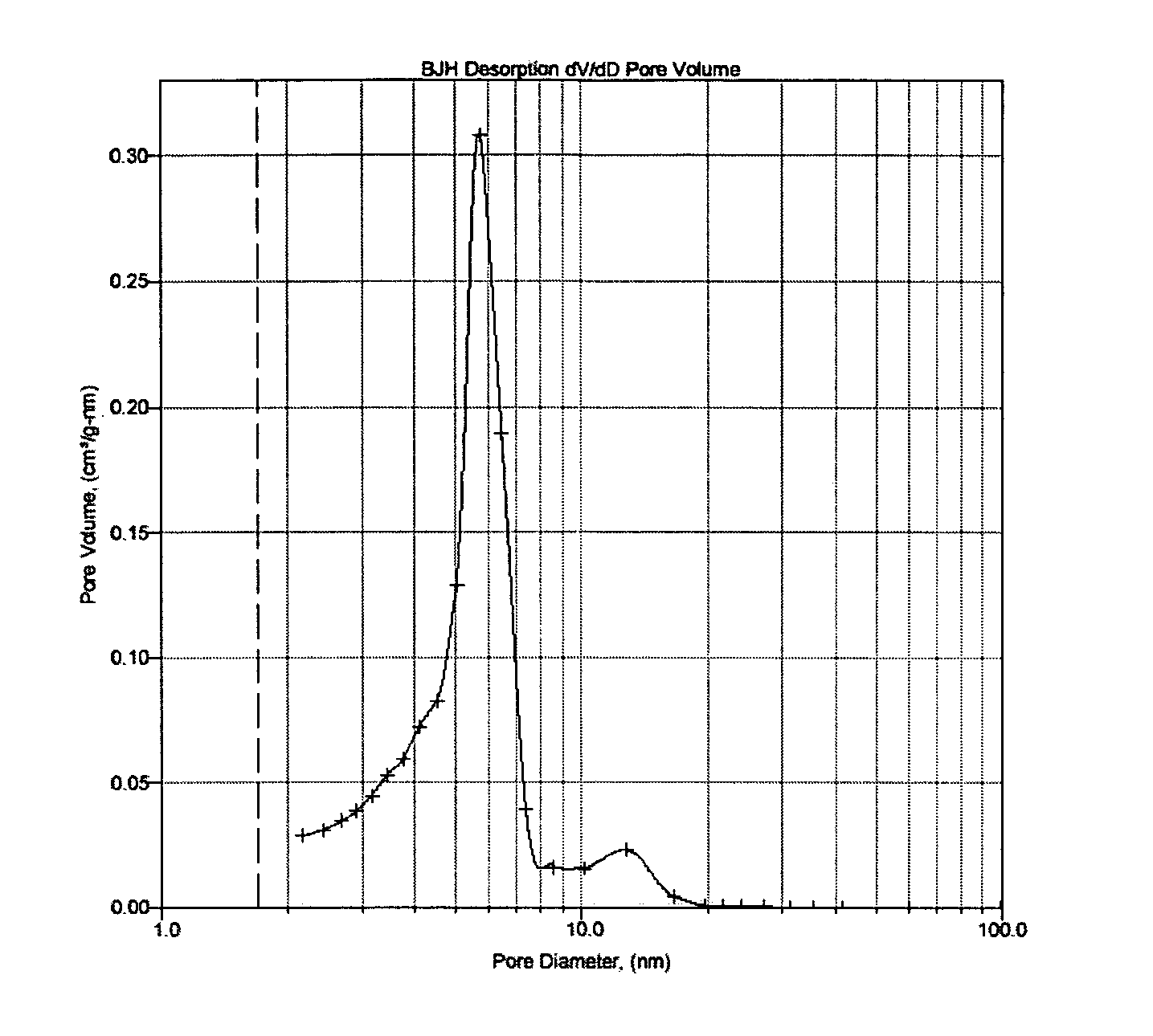Silica-alumina catalyst support with bimodal pore distribution, catalysts, methods of making and using same
a catalyst and silicon alumina technology, applied in the direction of catalyst activation/preparation, physical/chemical process catalysts, metal/metal-oxide/metal-hydroxide catalysts, etc., can solve the problems of increasing the cost of natural gas, reducing the natural resource of crude oil used for liquid fuels such as gasoline and middle distillates, and presenting technological challenges
- Summary
- Abstract
- Description
- Claims
- Application Information
AI Technical Summary
Benefits of technology
Problems solved by technology
Method used
Image
Examples
example 1
Preparation of Catalyst Support
Gel 1 Preparation
[0088]Silica / alumina gel with a silica-to-alumina molar ratio of 70:1 was prepared by co-precipitating sodium aluminate and sodium silicate with the addition of diluted nitric acid. A hydrogel was obtained within 30 minutes, and the gelation pH was 10.15. The total weight of the gel was 2,210 g.
Gel 2 Preparation
[0089]Silica / alumina gel with a silica-to-alumina molar ratio of 70:1 was prepared by co-precipitating sodium aluminate and sodium silicate with the addition of diluted nitric acid. A hydrogel was obtained within 30 minutes, and the gelation pH was 10.85. Because the gelation pH of the second gel is greater than that of the first gel, the second gel should have a greater average pore size than the first gel. The total weight of the gel was 1,950 g.
Support Preparation
[0090]Silica / alumina support having a bimodal pore size distribution with a silica-to-alumina molar ratio of 70:1 was prepared by mixing 2,210 g of Gel 1 and 487.5 g...
example 2
Catalyst Preparation and Testing
[0093]A cobalt catalyst was made by impregnating bimodal silica / alumina support Example 1. A sample of the silica-alumina support Example 1 was impregnated with an aqueous solution of cobalt nitrate Co(NO)36H2O and platinum(II) acetylacetonate using an appropriate quantity for incipient wetness. The catalyst precursor was then dried in air at 120° C. for 2 hours and calcined in air at 240° C. for 4 hours. The finished catalyst contained 20 wt. % cobalt (Co) and 0.014 wt. % platinum (Pt), with the remainder being the silica-alumina support.
Fixed Bed Testing
[0094]The catalyst was tested in a fixed bed reactor. The conditions included a temperature of 220° C., a pressure of 350 psig, a hydrogen-to-carbon monoxide molar ratio of 2, and a space velocity of 6 NL / h / kg catalyst. The time on stream (TOS), mole percent CO converted to hydrocarbons (CO Conv.), mole percent methane in the hydrocarbons (C1), production of C5+ hydrocarbons (C5+ prod.) in gram per h...
PUM
| Property | Measurement | Unit |
|---|---|---|
| pore size-distribution | aaaaa | aaaaa |
| pore size-distribution | aaaaa | aaaaa |
| pore size-distribution | aaaaa | aaaaa |
Abstract
Description
Claims
Application Information
 Login to View More
Login to View More - R&D
- Intellectual Property
- Life Sciences
- Materials
- Tech Scout
- Unparalleled Data Quality
- Higher Quality Content
- 60% Fewer Hallucinations
Browse by: Latest US Patents, China's latest patents, Technical Efficacy Thesaurus, Application Domain, Technology Topic, Popular Technical Reports.
© 2025 PatSnap. All rights reserved.Legal|Privacy policy|Modern Slavery Act Transparency Statement|Sitemap|About US| Contact US: help@patsnap.com

